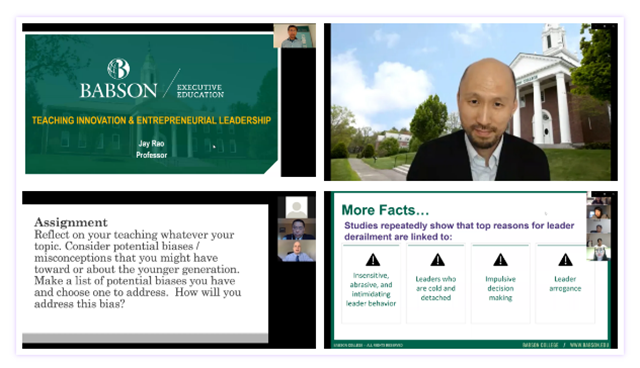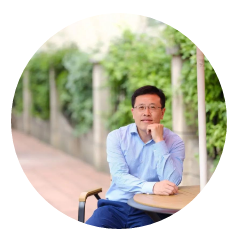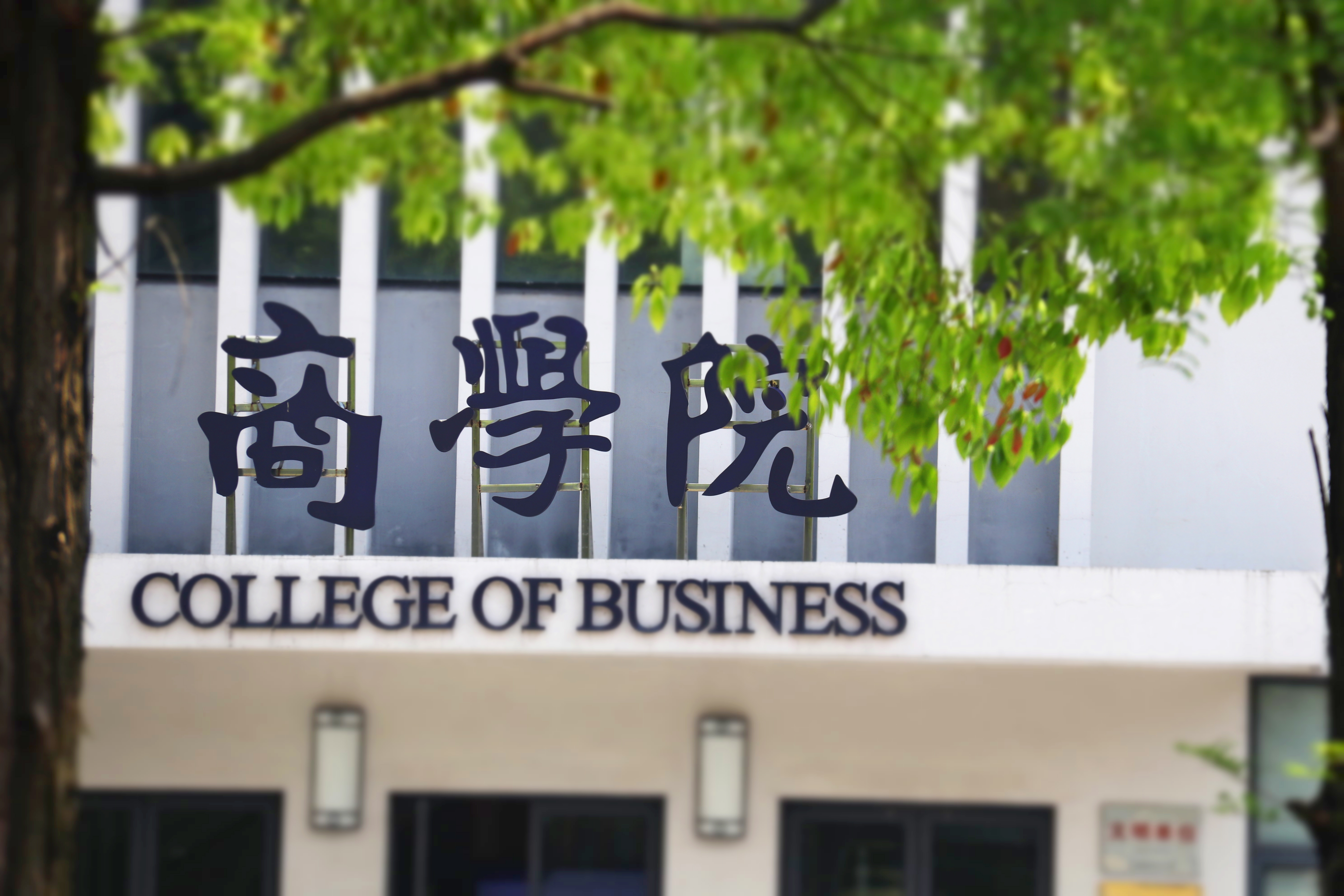Recently, Babson, in cooperation with Harvard and Stanford schools, has jointly launched Eli Asia online teacher training courses to assist teachers to participate in online teacher training. This course combines ELI Asia, SEE Asia, ELI SF and other lines of the essence of teachers' curriculum. Through Zoom online teaching and integration of new interactive forms, it helps teachers improve teachers' leadership and learn new teaching methods from a multidimensional perspective. The total cycle of the training course is over three weeks, and 1.5 hours of online teaching is conducted every week for 4-5 days. It systematically interprets the topics of leadership, entrepreneurship and teaching trends in the post epidemic period from different dimensions.

More than 70 business school teachers in China participated in the training, including Chen Zhijun, Han Yulan, Tian XiaoCong, Xu Shujun, Ye Weiling, Zhang Deyuan, Zhong Hongjun and Zhu Zhou from College of Business. Through the training, teachers have more in-depth understanding and Thinking on the effectiveness of leadership in the period of pandemic, the personal difficulties of leaders' self-transformation and the future teaching methods of universities after the pandemic. After the training, some teachers shared feelings (the following contents are sorted by the Pinyin of the teacher's surname).

Learning summary of teacher training program of entrepreneurship leadership and innovation (ELI) of Babson College
This is the second time that I have participated in the teacher training program of Babson College. The first time was in 2015. At that time, I encountered a bottleneck in the teaching of the course "organizational behavior and leadership development", and I especially wanted to find a breakthrough point. That study gave me three inspirations: we should not only talk about leadership, but also understand business; we should use the way of continuous questioning to inspire students to do deep thinking; we should form our own teaching style.
In this training program, although many professors emphasized the importance of action based and empirical learning, they were not effectively reflected in the course. I'm also thinking about the reason. At present, five reasons are summarized.
First, there is no new research on leadership in VUCA. Perhaps there is no new phenomenon at all.
Secondly, many contents in the field of leadership are like philosophy of life and chicken soup for the soul. It may be exciting to give a speech on the theme, but it is likely to be a parallel product or preach in the classroom. Experiential teaching is a relatively effective teaching method, but it is difficult to design specific experience scenes for different projects.
Third, online teaching limits the use of some teaching methods, leading to the decline of students' experience. If more offline activities can be designed into online mode, this problem can be solved to a certain extent.
Fourthly, the teaching effect is influenced by cultural differences. With the same teaching content and method, audiences in different cultural backgrounds may have very different responses.
Fifthly, the real strength of Babson College is not reflected in classroom teaching, but in the entrepreneurial ecosystem formed around the training direction. Learning it in class is just a superficial study.
Although the training program of Babson did not give me much substantial help, it made me do a lot of reflection. In the future teaching, I will continue to look for ways to solve their current problems through these reflections and try to break through the bottleneck.

This round of training (ELI Asian) is coming to an end after three weeks of intensive training. This is the fourth time I have participated in the training organized by Babson. Although there are some differences in the theme of each time, they are all around the theme of innovation and entrepreneurship. I can say that every training is very fruitful, and these are gradually integrated into my teaching. To put it simply:
First, teachers are very passionate and infectious. They will extend from a picture, or a small matter, to talk about their own feelings and connect with the content of the course, so that the listeners can easily accept and be impressed.
Second, the teaching methods of teachers are diversified. Often set a certain situation, let students (we) think, do not rush to tell you the answer, sometimes will give a questionnaire in time, easy to answer that kind, everyone immediately knows the feedback, and give the evaluation. This kind of teaching is really student-centered. Teaching is not what you say, but what the students hear and remember.
Third, teachers' teaching is not confined to a theoretical framework, but more around a theme, combined with their own insights, fascinating. They must be devoted to the teaching, pay great attention to the accumulation of peacetime to have such a rich material.
Fourth, although my major is operation, I feel that teaching by university teachers is actually an innovative process. We should constantly innovate in teaching content, teaching form and teaching style. I remember that Professor Jay Rao gave his students' teaching evaluation when he was just a teacher in Dalian, which is also terrible. But through constant accumulation and innovation, he is now the most popular professor.

The three week Eli Asia is over. Although I attended systematic courses on entrepreneurship in Babson before, I still learned a lot from the three weeks of online courses, especially after I had just finished two classes of strategic management through zoom. The teaching methods of these international colleagues, their passion for teaching, and some skills of online courses have made me realize that there is no end to learning. I can better learn and integrate their skills in the later online teaching, so as to make my online courses more excellent. Specifically, I think the most valuable points for me are as follows:
First, we need to learn to be sympathetic leaders. Sympathetic leader is an active leader who is good at connecting and guiding others. Sympathetic leader, emphasizing emotional intelligence and social ability. This is particularly important for business school teachers, because we are dealing with students who have been working regularly and have strong critical ability. When dealing with them, we need to think more from their perspective, and we also need to give them more encouragement so that they can better develop their potential.
Second, we should dare to fail. In the second week of the course, we learned a lot about entrepreneurship. In this part, I personally think the most important thing is to dare to fail. This is especially meaningful for teachers. Because the teacher is usually regarded as authority, can’t make mistakes, can’t fail. The thinking of not daring to fail will make the teacher want to control the classroom more and reduce the students' participation. The thinking of daring to fail can let teachers try different teaching methods and encourage students to participate in interaction.
Third, we need to understand ourselves better. We learn not from experience, but from reflection. Understanding ourselves can help us avoid prejudice and better understand our students, especially in the face of the younger generation of students, we are prone to prejudice them. Each individual is unique and different. Avoiding the tag point of view can make us better communicate with students and improve the teaching effect.
Fourth, good teaching needs classroom design. This is what I learned from the teaching of Phil. There are many methods in classroom teaching. It is important to guide students' participation and interaction through teaching design in class, so as to avoid simple teaching and unilateral communication. The best learning effect must be active learning. How to guide students to learn actively needs better classroom design.

First Resonant leadership, taught by professor Scott Taylor, emphasizes the positive tone of self-reflection and communication. How do teachers, like leaders, influence students' emotional feelings through their words and deeds at all times, and guide students' behavioral reactions. In the teaching process, we should constantly reflect on our own behavior and maintain positive emotions and mentality in the communication, so as to improve the effect of teaching interaction under the premise of creating a positive and friendly teaching atmosphere.
Second Characteristics of entrepreneurs taught by Professor Matt Allen: act first, then think. As college teachers who have been trained for many years, we have been used to thinking carefully, thinking twice and acting cautiously. Entrepreneurship education emphasizes that if you have an idea, you should start to act. Through action, you can try and error, collect data, and optimize decision-making. This is a very enlightening behavior change. Positive action also means that you don't have to wait for the right time to start, but start with the limited resources on hand, and be good at capturing opportunities and creating conditions to achieve goals. Teachers will not only be more sensitive to action, but also use the difference to help us learn more about themselves.
Thanks to the training and learning opportunities offered by the Institute, I will continue to reflect on and grow up in the unfavorable environment of the epidemic, and optimize the teaching work in the future.

